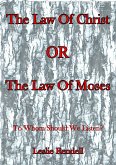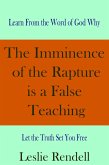From the very first chapter, the book establishes that sin, regardless of its form or magnitude, separates humanity from God. The author argues that sin is universal and that no one is exempt from its influence or its consequences.
One of the central themes of the book is the equality of sin. The Bible teaches that there is no hierarchy of sinno sin is greater or lesser in the eyes of God. Jesus' words in Matthew 5:21-22 and Matthew 5:27-28 demonstrate that sin is not just about outward actions, but also includes the thoughts and attitudes of the heart. Whether one has murdered someone or harboured hatred, whether one has committed adultery or merely lusted, Jesus declares that both are equally sinful in God's sight. This radical teaching challenges many traditional views of sin, where certain sins are viewed as more grievous than others, and calls Christians to examine their own hearts with humility and honesty.
The book then turns its attention to the concept of sinnerspeople who, regardless of the specific nature of their sin, are all equally in need of salvation. The author makes the case that all sinnerswhether they are guilty of overt crimes or appear to live morally upright livesare under the same condemnation of sin. The only distinction between sinners is their response to God's offer of salvation through Jesus Christ. This perspective fosters a greater sense of humility, as Christians are reminded that no one is better or worse than another in the eyes of God.
The idea that all sinners are the same is foundational to understanding the grace of God. Since all have sinned, all are in need of the same salvation. The book explores how God's grace is offered freely to everyone, regardless of their past or the severity of their sin. Through the sacrifice of Jesus Christ on the cross, God extends forgiveness to all who repent and believe in His Son. The author emphasises that salvation is not earned by good works or moral living but is given by God's unmerited grace to those who turn to Him in faith.
Whether a person is seen as righteous or deeply sinful by society, in God's eyes, every soul is precious, and every sinner is worthy of His redemptive love. The book reminds readers that no one is beyond the reach of God's grace, and all sinners are invited to come to Him for forgiveness, healing, and restoration.
The realisation that we are all equal in our need for God's grace leads to a deeper sense of compassion and forgiveness toward others. It challenges the reader to extend the same grace to those who have wronged them, recognising that all are sinners in need of redemption.
In the final chapters, the author offers a powerful call to repentance and holiness, encouraging believers to live lives that reflect the transforming power of God's grace. While sin is universal and equal in its ability to separate us from God, God's grace is even more powerful, capable of cleansing and restoring every sinner who turns to Him in faith.
All Sin and All Sinners Are the Same challenges readers to look beyond the surface of their actions and recognise the deeper reality of sin in their hearts. It offers a sobering reminder that all are guilty before God and that only through faith in Jesus Christ can we be reconciled to our Creator. The book is a powerful tool for those seeking a greater understanding of sin, grace, and the profound need for salvation. It calls Christians to a deeper level of humility, repentance, and love for others, reminding them that, in the eyes of God, all sinners are the same.
Dieser Download kann aus rechtlichen Gründen nur mit Rechnungsadresse in A, B, CY, CZ, D, DK, EW, E, FIN, F, GR, H, IRL, I, LT, L, LR, M, NL, PL, P, R, S, SLO, SK ausgeliefert werden.









